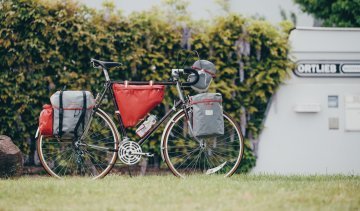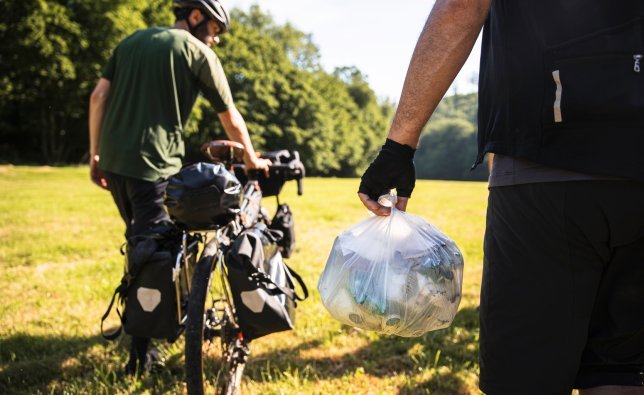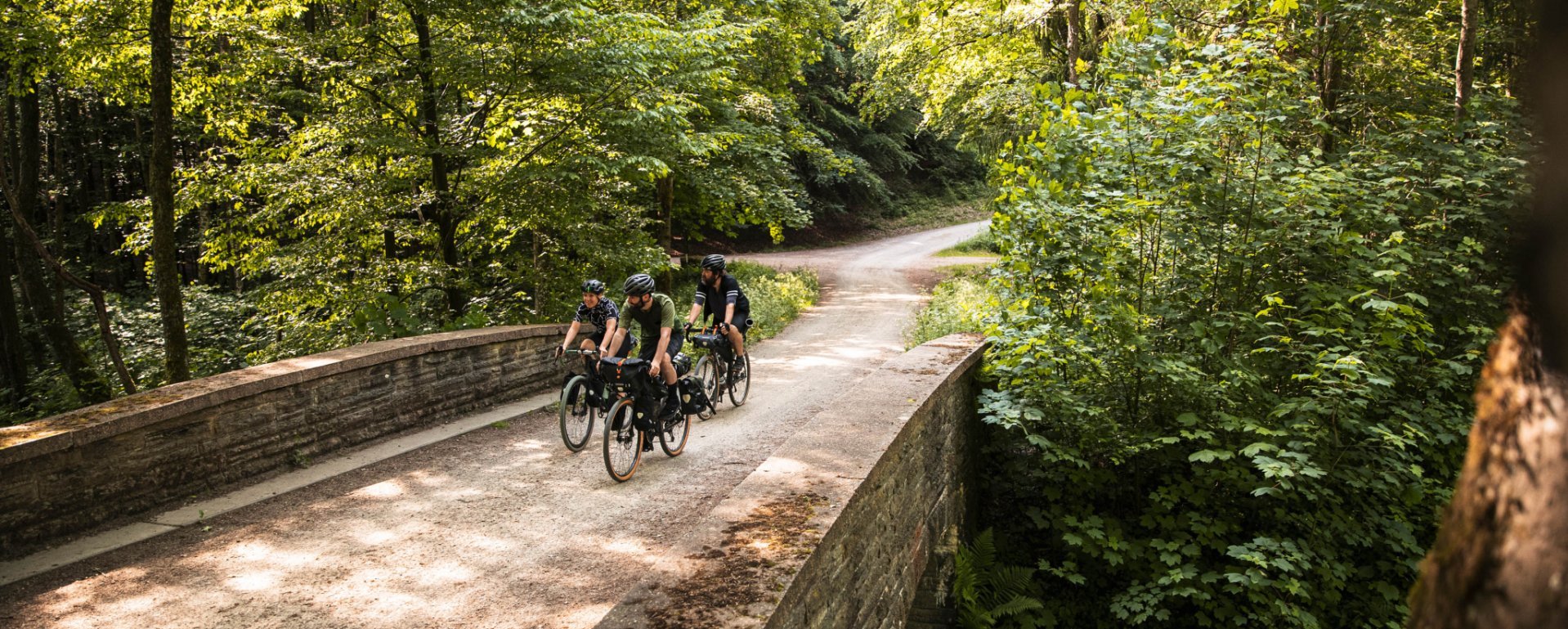
On the Road with bc: The ORTLIEB Factory Tour. ...
Andi visited the bicycle bag specialist ORTLIEB in Heilsbronn. A factory tour and a bike overnighter were on the agenda.
Being respectful of nature is a quintessential aspect of bikepacking. Here’s the code of conduct every adventurer and nature lover should abide by.
Bikepacking and micro-adventures are a hot trend. More and more people are discovering how big or small outdoor biking adventures can enrich their lives, and how a brief escape from everyday life can bring about new sources of strength and confidence. Whether it’s just a night in the forest or a big tour, more people in nature also means more stress on the environment. To avoid conflicts and ensure that your bikepacking adventure is as harmonious with nature as possible, we have summarised the most important tips in a small code.
This motto is our guiding principle: Leave no trace! This can be understood in a multitude of ways: from leaving skid marks on the trail, to rubbish in the forest, to the marks your encounters leave on other people. However, it is important to realise that every bit of human activity leaves its mark on nature. Your adventure always has an impact on others. Therefore, try to minimise your impact as much as possible.
Everything you bring into nature must be taken out of it with you. This truth should actually be self-evident – unfortunately, however, it’s not often the case. Even supposedly easily biodegradable materials like paper tissues or banana peels have become a big nuisance in recent years. Both can take over a year to decompose completely, so be sure to take them back with you. It’s best to think about avoiding waste when planning your tour, and use, for example, reusable instead of disposable packaging. You can also easily do more if you want to. If you take a bit of other people’s rubbish home with you every time you go on an overnighter, you’re both doing something more for the environment and improving your karma. Tip: A waterproof stuff sack makes an excellent bin liner.

Taking your own rubbish back is not a heroic act, but a matter of course. In addition, taking other people’s rubbish with you that you stumble across definitely affords you some good karma. © bc GmbH & Co. KG
Unlike in Scandinavian countries, there is no so-called "everyman's right" in Central Europe. Setting up a permanent “camp” (tent, tarp, hut) is only allowed in Germany and the Alpine region under very specific conditions. For an emergency bivouac, the rules are less strict – shelters or barbecue huts in the forest are suitable for this, for example. Map services such as Komoot or Open Street Map often show where these are located. Even those who set up their bivouac and sleeping bag on a mountain peak at sunset, and disappear again at first light, usually encounter few problems. However, wild overnight stays in protected areas such as national parks, nature reserves or FFH (Flora Fauna Habitat) areas should be just as taboo as on private property or near residential buildings. A good idea when looking for a campsite is often to ask a farmer if you can pitch your tent on his meadow in exchange for a bit of monetary compensation. The ever-growing number of camping sites also offers a more legal alternative. Bonus tip for bivouacking: don't cook and sleep in the same place.
Even if it is very tempting: A campfire in the great outdoors is not a good idea and sets a bad example. Abandoned campfires can lead to bigger fires, have an increasingly adverse effect on wildlife, changes vegetation and soil, and can often be seen and smelled for miles. It is not for nothing that many Scandinavian national parks only permit campfires in order to avert life-threatening situations. Public barbecue areas with prepared fireplaces are an exception to this rule.
An entire book is dedicated to this topic for good reasons. If at all possible, avoid going to the toilet in nature and use infrastructure such as petrol stations or cafés. For those times when you can’t, always have a small shovel with you and bury your excrement at least thirty centimetres deep. In this case, it’s best to dig a hole beforehand. Search for a spot that’s a sufficient distance from the river or lake shore--fifty to one hundred metres is a good rule of thumb. Make sure to take your toilet paper back to civilisation in a plastic bag and dispose of it there. This also applies to your excrement if you cannot bury it deep enough--no time to be squeamish or disgusted by it. Otherwise, wild animals will dig it up again when searching for food.
Nature is more than a pretty Instagram backdrop or canvas for your adventures. It is primarily a habitat for animals and plants. Be sure to respect local protected areas and behave in a way that causes as little disturbance as possible. As a human, you are only a guest in their world. Night rides, for example, are not a good idea ecologically. Many animal species have to switch to twilight and night hours anyway because of the high stresses caused by human encroachment. They urgently need this time for rest or food. However, you should also respect plants. That wildflower bouquet simply looks better in the forest clearing than at home in a vase. Speaking of plants: take care to preserve vegetation and soil as much as possible, both during your journey and while camping. Moorland and wetlands or alpine meadows are particularly sensitive.
As outdoor sports enthusiasts and nature users, we like to share our enthusiasm with like-minded people. Still, it's often not a good idea to upload your bikepacking trips to Strava or share the most beautiful nature spots on Instagram. Just enjoy taking in all of nature’s splendour, and keep quiet so as not to increase the level of encroachment and avoid hotspots. Instead, share your positive attitude towards nature and your wonderful experiences in it. This way, you’ll find a better kind of imitator – not because they admire you for your tours, but for your responsible attitude.
